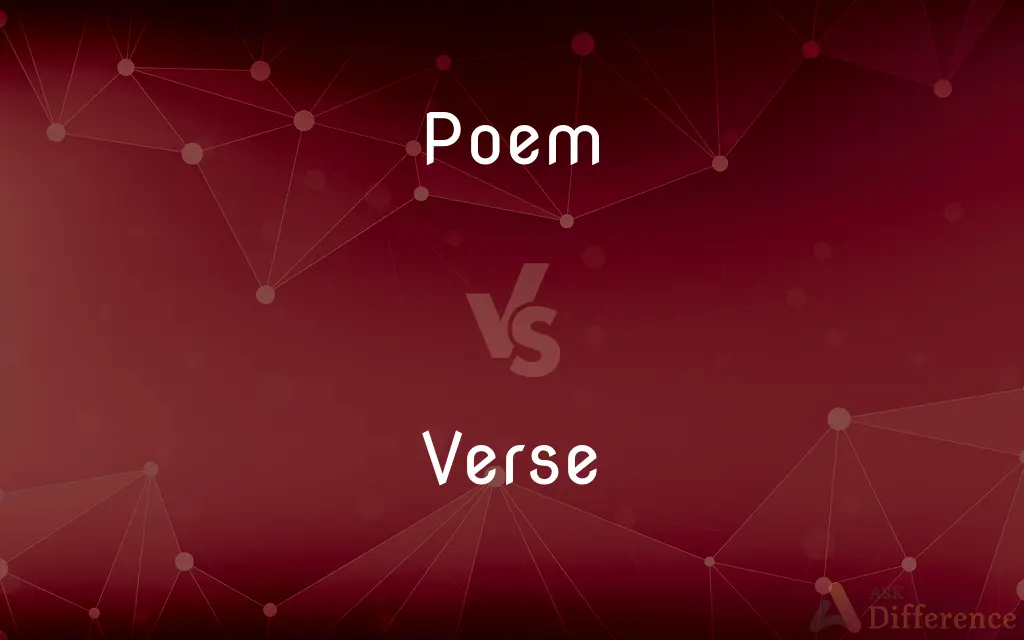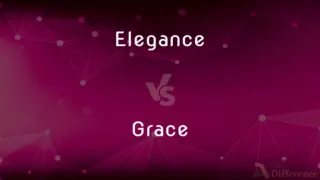Poem vs. Verse — What's the Difference?
Edited by Tayyaba Rehman — By Urooj Arif — Updated on April 15, 2024
Poems are structured works with artistic expression, focusing on emotions or themes, while verses are components of poems or songs, characterized by a series of lines.

Difference Between Poem and Verse
Table of Contents
ADVERTISEMENT
Key Differences
Poems are written works that express ideas, emotions, or stories through the distinct use of style and rhythm; they often aim to evoke a particular mood or emotion. Whereas verses refer to individual, numbered sections of a poem or song, typically consisting of multiple lines that collectively convey a part of the overall theme.
Poems can be structured in various styles, including free verse, sonnets, or haiku, each with specific rules regarding length, rhythm, and rhyme. On the other hand, a verse in the context of poetry or songs represents a single stanza or a group of lines that maintain a pattern within the larger piece.
Poems utilize figurative language and literary devices such as metaphor, simile, and alliteration to enhance the depth and resonance of the text. Verses, while also employing these devices, do so within their confined structure to contribute to the poem's or song's rhythm and thematic progression.
The intent behind poems is often to explore complex human experiences, emotions, or concepts in a nuanced and often abstract way. Verses serve to build upon each other within a poem or song, supporting the overarching narrative or theme through their sequential nature.
Poems are standalone works of art that can be interpreted in various ways, often leaving the meaning open to the reader’s interpretation. In contrast, verses are more directly tied to the context of the poem or song they belong to, playing a specific role in advancing the narrative or thematic elements.
ADVERTISEMENT
Comparison Chart
Definition
A creative literary composition with deep thematic elements.
A subdivision of a poem or song, often a stanza.
Structure
May follow specific forms like sonnets or be free-form.
Typically a series of lines that follows a specific metric pattern.
Purpose
To evoke emotions, convey messages, or portray ideas artistically.
To build upon the narrative or theme within the broader text.
Use of Language
Employs various literary devices to enhance expression.
Uses rhythmic and rhyming patterns to support the overall structure.
Interpretation
Often open-ended, allowing for multiple interpretations.
Generally more straightforward, contributing directly to the text’s message.
Compare with Definitions
Poem
A piece of writing that partakes of the nature of both speech and song.
She read a poem that captured the audience’s hearts.
Verse
A part of a song or poem forming a unit.
The catchy verse was stuck in her head all day.
Poem
A work of art that expresses feelings and ideas with a distinctive style and rhythm.
His latest poem explores the theme of loss and recovery.
Verse
One of the lines in a poem or a song.
The first verse set the tone for the entire performance.
Poem
Literature that evokes a concentrated imaginative awareness of experience.
The poem provided a profound commentary on societal issues.
Verse
Text presented in poetic lines and stanzas.
He preferred the verses of the poem that spoke of hopeful futures.
Poem
A set of lines that may include rhyme and meter, forming a stanza or a complete composition.
The classic poem was taught in schools across the country.
Verse
A subdivision of a chapter in the Bible or other religious text.
The preacher quoted a verse from the Book of Job.
Poem
A composition typically written in verse to emphasize experiential and emotional responses.
The poem used vivid imagery to depict the storm.
Verse
A metric line of poetry named according to the kind and number of feet composing it.
The verse consisted of an iambic pentameter.
Poem
A verbal composition designed to convey experiences, ideas, or emotions in a vivid and imaginative way, characterized by the use of language chosen for its sound and suggestive power and by the use of literary techniques such as meter, metaphor, and rhyme.
Verse
A single metrical line in a poetic composition; one line of poetry.
Poem
A composition in verse rather than in prose
Wrote both prose and poems.
Verse
A division of a metrical composition, such as a stanza of a poem or hymn.
Poem
A literary composition written with an intensity or beauty of language more characteristic of poetry than of prose.
Verse
A poem.
Poem
A literary piece written in verse.
Verse
Metrical or rhymed composition as distinct from prose; poetry.
Poem
A piece of writing in the tradition of poetry, an instance of poetry.
Verse
The art or work of a poet.
Poem
A piece of poetic writing, that is with an intensity or depth of expression or inspiration greater than is usual in prose.
Verse
A group of poems
Read a book of satirical verse.
Poem
A metrical composition; a composition in verse written in certain measures, whether in blank verse or in rhyme, and characterized by imagination and poetic diction; - contradistinguished from prose; as, the poems of Homer or of Milton.
Verse
Metrical writing that lacks depth or artistic merit.
Poem
A composition, not in verse, of which the language is highly imaginative or impassioned; as, a prose poem; the poems of Ossian.
Verse
A particular type of metrical composition, such as blank verse or free verse.
Poem
A composition written in metrical feet forming rhythmical lines
Verse
One of the numbered subdivisions of a chapter in the Bible.
Verse
To versify or engage in versifying.
Verse
To familiarize by study or experience
He versed himself in philosophy.
Verse
To play against (an opponent) in a competition.
Verse
A poetic form with regular meter and a fixed rhyme scheme.
Restoration literature is well known for its carefully constructed verse.
Verse
Poetic form in general.
The restrictions of verse have been steadily relaxed over time.
Verse
One of several similar units of a song, consisting of several lines, generally rhymed.
Note the shift in tone between the first verse and the second.
Verse
A small section of a holy book (Bible, Quran etc.)
Verse
(music) A portion of an anthem to be performed by a single voice to each part.
Verse
(obsolete) To compose verses.
Verse
(transitive) To tell in verse, or poetry.
Verse
To educate about, to teach about.
He versed us in the finer points of category theory.
Verse
To oppose, to compete against, especially in a video game.
Verse him, G!
Verse
Metrical arrangement and language; that which is composed in metrical form; versification; poetry.
Such prompt eloquenceFlowed from their lips in prose or numerous verse.
Virtue was taught in verse.
Verse embalms virtue.
Verse
A short division of any composition.
Verse
A stanza; a stave; as, a hymn of four verses.
Verse
A piece of poetry.
Verse
One of the short divisions of the chapters in the Old and New Testaments.
Verse
A portion of an anthem to be performed by a single voice to each part.
Verse
To tell in verse, or poetry.
Playing on pipes of corn and versing love.
Verse
To make verses; to versify.
It is not rhyming and versing that maketh a poet.
Verse
Literature in metrical form
Verse
A piece of poetry
Verse
A line of metrical text
Verse
Compose verses or put into verse;
He versified the ancient saga
Verse
Familiarize through thorough study or experience;
She versed herself in Roman archeology
Common Curiosities
Is verse only related to poetry?
No, verse can also refer to parts of songs or segments of written texts in other forms like sacred texts.
Can a poem exist without verses?
Yes, poems can be written in free verse, which does not require a conventional stanza structure.
What is the main purpose of a poem?
The main purpose of a poem is to express thoughts, feelings, and ideas in a beautiful, often rhythmic and symbolic language.
What distinguishes a poem from a verse?
A poem is a complete work of art, while a verse is typically a part of a poem or song.
What makes a poem effective in conveying messages?
Effective use of language, emotion, and imagery makes a poem powerful in conveying messages.
What role does rhyme play in a verse?
Rhyme provides a rhythmic structure and aids in enhancing the musical quality of a verse.
How does cultural context influence the form of poems?
Cultural contexts can dictate the traditional forms, themes, and styles of poems prevalent in a particular culture.
How is the structure of traditional poems different from free verse poems?
Traditional poems follow specific patterns of rhyme and meter, whereas free verse poems do not adhere to such rules, offering more freedom in form.
How does a verse function within a poem?
A verse functions as a building block within a poem, contributing to the overall theme and structure.
What are some common forms of poems?
Common forms include sonnets, haikus, limericks, and free verse.
How can understanding verses help in appreciating poems more fully?
Understanding verses and their construction helps in appreciating the rhythm, themes, and emotional undertones of poems.
Can verses exist independently outside of poems and songs?
Yes, verses can stand alone, especially in the form of quotations or proverbial sayings.
How do verses impact the overall impact of a poem or song?
Verses structure the flow and build the narrative or thematic momentum in poems and songs.
Do all verses need to rhyme?
No, not all verses need to rhyme, especially in modern poetry and songs.
What is an example of a famous poem and its impactful verse?
"The Road Not Taken" by Robert Frost, especially the verse "Two roads diverged in a wood, and I—"
Share Your Discovery

Previous Comparison
Taekwondo vs. Kickboxing
Next Comparison
Elegance vs. GraceAuthor Spotlight
Written by
Urooj ArifUrooj is a skilled content writer at Ask Difference, known for her exceptional ability to simplify complex topics into engaging and informative content. With a passion for research and a flair for clear, concise writing, she consistently delivers articles that resonate with our diverse audience.
Edited by
Tayyaba RehmanTayyaba Rehman is a distinguished writer, currently serving as a primary contributor to askdifference.com. As a researcher in semantics and etymology, Tayyaba's passion for the complexity of languages and their distinctions has found a perfect home on the platform. Tayyaba delves into the intricacies of language, distinguishing between commonly confused words and phrases, thereby providing clarity for readers worldwide.
















































